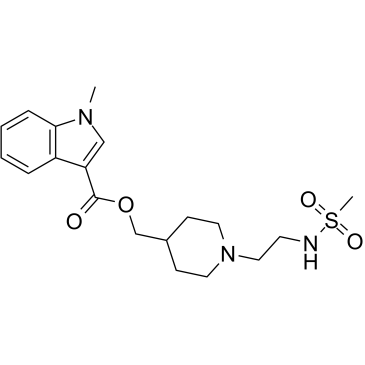Electrophysiological effects of prucalopride, a novel enterokinetic agent, on isolated atrial myocytes from patients treated with beta-adrenoceptor antagonists.
Davide Pau, Antony J Workman, Kathleen A Kane, Andrew C Rankin
Index: J. Pharmacol. Exp. Ther. 313(1) , 146-53, (2005)
Full Text: HTML
Abstract
Prucalopride is a selective 5-hydroxytryptamine type 4 (5-HT4) receptor agonist developed for the treatment of gastrointestinal disorders. The endogenous agonist 5-HT acting via 5-HT4 receptors increases the L-type Ca2+ current (I(CaL)) with potentially proarrhythmic consequences (Pau et al., 2003). The aims of this study were to investigate the effects of prucalopride on I(CaL), action potentials, refractory period, and arrhythmic activity in human atrial myocytes, and to compare these with the effects of 5-HT, using the whole-cell perforated patch-clamp technique. Prucalopride (10(-9) to 10(-4) M) produced a concentration-dependent increase in I(CaL) amplitude, with a maximum response at 10 microM, from -5.3 +/- 0.6 to -10.9 +/- 1.5 pA/pF (p < 0.05; n = 22 cells, 10 patients), without affecting its voltage-dependence. Subsequent application of 10 microM 5-HT further increased I(CaL) to -17.7 +/- 2.8 pA/pF (p < 0.05; n = 16 cells, 9 patients). The increase in I(CaL) by prucalopride, 98 +/- 15%, was significantly smaller than that by 5-HT, 233 +/- 26% (p < 0.05). Prucalopride (10 microM) significantly increased the action potential duration at 50% repolarization (APD50) from 12 +/- 2 to 17 +/- 3 ms (p < 0.05; n = 22 cells, 9 patients). Following washout of prucalopride, 5-HT (10 microM) increased APD50, to a greater extent, from 14 +/- 3 to 32 +/- 7 ms (p < 0.05; n = 11 cells; 8 patients). The APD75, APD90, and effective refractory period were unaffected by prucalopride or 5-HT. Furthermore, 5-HT induced abnormal depolarizations in 27% of the cells studied, whereas prucalopride induced none (p < 0.05). In conclusion, in human atrial cells, prucalopride, at concentrations markedly above those used therapeutically, acted as partial agonist on I(CaL) and APD50, with no effect on late repolarization or refractory period, and was devoid of arrhythmic activity.
Related Compounds
| Structure | Name/CAS No. | Molecular Formula | Articles |
|---|---|---|---|
 |
GR113808
CAS:144625-51-4 |
C19H27N3O4S |
|
Novel antagonists of serotonin-4 receptors: synthesis and bi...
2009-03-15 [Bioorg. Med. Chem. 17 , 2607-2622, (2009)] |
|
Dual role of serotonin in the pathogenesis of indomethacin-i...
2012-09-01 [Pharmacol. Res. 66(3) , 226-34, (2012)] |
|
Molecular characterization of a purified 5-HT4 receptor: a s...
2005-05-27 [J. Biol. Chem. 280(21) , 20253-60, (2005)] |
|
A 5-HT4 agonist, mosapride, enhances intrinsic rectorectal a...
2005-08-01 [Am. J. Physiol. Gastrointest. Liver Physiol. 289(2) , G351-60, (2005)] |
|
5-HT4 and 5-HT2 receptors antagonistically influence gap jun...
2010-01-01 [J. Mol. Cell. Cardiol. 48(1) , 220-9, (2010)] |